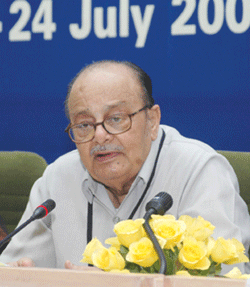Union human resources development (HRD) minister Arjun Singh has courted many controversies in the recent past. Following the passage of the Central Educational Institutions (Reservations in Admissions) Act, 2006 by Parliament, reserving an additional 27 percent quota for OBCs in Central government institutions of higher education and its validation by the Supreme Court on April 10 (see EW special report May 2008), Singh has further shored up his support base by making another populist proposal: provision of government counter-guarantees for student loans drawn from banks for the pursuit of higher education.
 Ironically, the proposal didn’t originate in the HRD ministry, but was included in a higher education 20-point reform charter drawn up by the Delhi-based Associated Chambers of Commerce and Industry, a leading industry lobby. Singh’s announcement on May 17 that the government is seriously weighing the suggestion was made at the Fourth International Educational Fair organised by Assocham — whose name itself suggests the buying and selling of education and degrees, and which has been promoting private sector initiatives in higher education.
Ironically, the proposal didn’t originate in the HRD ministry, but was included in a higher education 20-point reform charter drawn up by the Delhi-based Associated Chambers of Commerce and Industry, a leading industry lobby. Singh’s announcement on May 17 that the government is seriously weighing the suggestion was made at the Fourth International Educational Fair organised by Assocham — whose name itself suggests the buying and selling of education and degrees, and which has been promoting private sector initiatives in higher education.
However, Singh put his own spin on the idea, radically different from the commercialisation of education. “Education cannot be bought and sold over the counter... We cannot leave it to market forces to control higher education… Higher education will be meaningless if it is not accessible to all,” he said.
At a fundamental level, government loan counter-guarantees make robust sense. Under prevalent norms followed by the Indian Banks Association, an individual must produce collateral for all loans above Rs.4 lakh. The rule applies even to students applying for loans to pursue higher studies. Given that India’s per capita annual income is less than one-tenth this amount, the norm effectively excludes the vast majority of students.
Elementary considerations of fairness and relative equality of opportunity demand either that the bank norm is relaxed for education loans, or that poorer students get a degree of state assistance in the form of loan counter-guarantees,” says Anuradha Chenoy, a professor at the School of International Studies at Jawaharlal Nehru University, Delhi, who has been examining issues of access of different social and economic categories of people to higher education. “Changing bank norms is a more difficult option for the government than offering state support. So the HRD ministry has gone for the softer option. But how far this will help is an open question.”
According to educationists in the national capital, this proposal involves several issues. First, many professional educational institutions including the six Indian Institutes of Management have recently raised their fees by several lakhs of rupees a year — irrespective of a student’s merit ranking. This means that the entry barrier has significantly risen in both private and state-run institutions.
Such iniquitous outcomes might be avoided if the government prescribes norms and ceilings for tuition fees, in keeping with international standards. But in the absence of such an initiative, the demand for student loans is bound to rise sharply.
Second, the interest rates payable on student loans are relatively high in India and the period of repayment is short compared with terms prevalent in most Western countries. For instance, a graduate studies student in the United States or most European Union countries can easily repay her loan over 10-15 years after graduation. That’s because the rate of interest is well under half of what Indian banks charge. Moreover in most Western countries, universities and private foundations also advance student loans at highly concessional rates.
Third, there is growing and overt corporatisation of education in India, whose sheer intensity and scale sets it apart from the situation in most developed countries. Many Western universities are rich and have huge endowments, but few would go in for induction of equity capital running into hundreds of millions of dollars, as Indian private educational ventures are doing.
In the very week that Arjun Singh made his announcement, the Central government permitted Manipal Universal Learning Pvt. Ltd to raise foreign equity equivalent to Rs.1,435 crore ($350 million). Not a few academics in Delhi believe that such corporatisation bodes ill for the future of higher education in India.
Thus while the loan counter-guarantee idea can help a relatively small number of students access higher learning, it leaves most of these deeper issues unaddressed.
Praful Bidwai (Delhi)